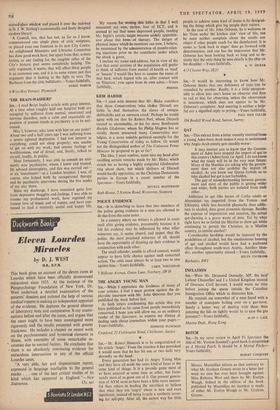SIR, — I read Brian Inglis's article with great interest. At a
time when roughly half our hospital beds are occupied by sufferers from mental, emotional and nervous disorders, such a calm and reasonable ex- position of present trends in psychiatry is to be wel- comed.
May I, however, take issue with him on one point? About two and a half years ago I was suffering from a severe agitated depression. I had lost interest in everything; could not sleep properly; was unable to get on with my work; had intense feelings of worthlessness, and of dread; and, finally, talked to myself, loudly, in public. Most fortunately, I was able to consult an emi- nently wise psychiatrist, whom I knew and trusted. He advised electroplexy, and this was carried out— in six 'instalments'—at a London hospital. I was, of course, also helped both by occupational therapy and by psychiatric interviews during the five weeks of my stay there.
Since my discharge, I have remained quite free from depressive thoughts and feelings. I was able to resume my professional work, have regained my former love of music and of nature, and have con- tinued to lead a normally useful and happy life. My reason for writing 'this letTer •is. that I well remember my own, earlier; fear of. ECT; and it seemed to me that some 'depressed people, reading Mr. Inglis's article, might become unduly apprehen- sive about this form of therapy. The danger of physical injury which he mentions can now, I believe,
ing injections prior to the amesthetic under which be minimised by the administration of muscle-relax- the shock is given.
I enclose my name and address, but in view of the fact that some sections of the population still prefer to think of sufferers from mental ill-health as 'mad' or 'lunatic' I would like here to assume the name of that bird, which legend tells us, after contact with an 'Electron,' rose again from its own ashes.—Yours


































 Previous page
Previous page